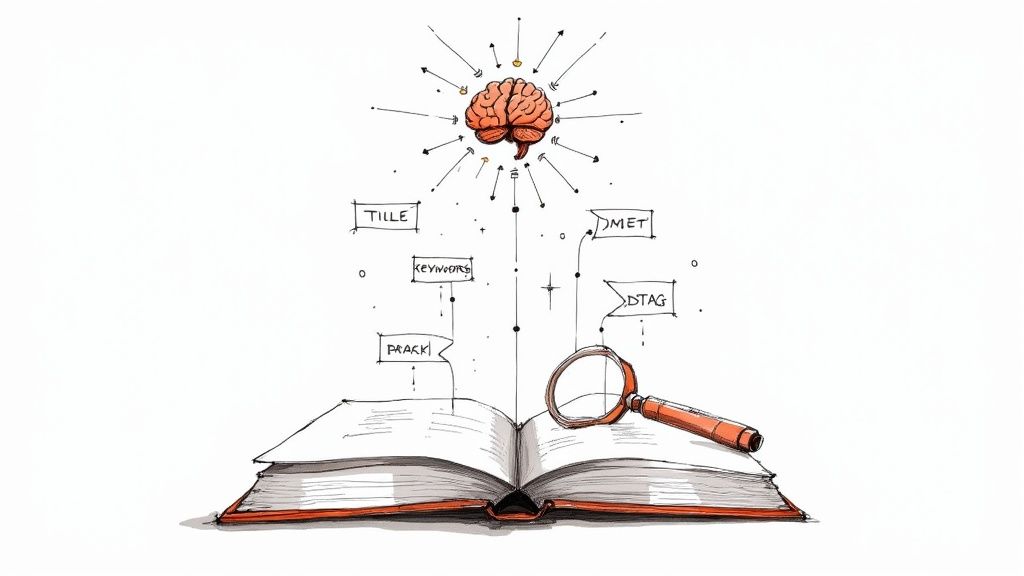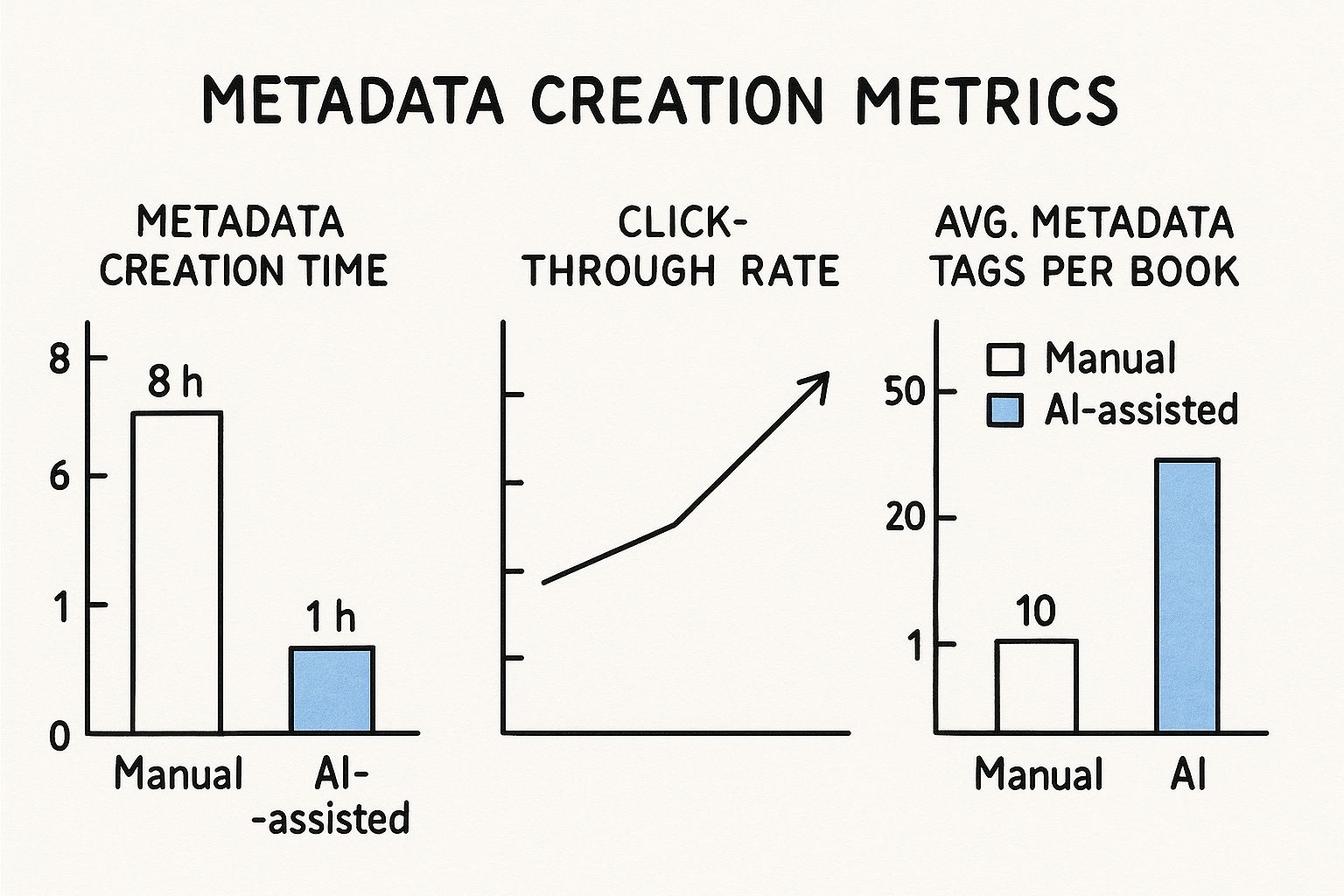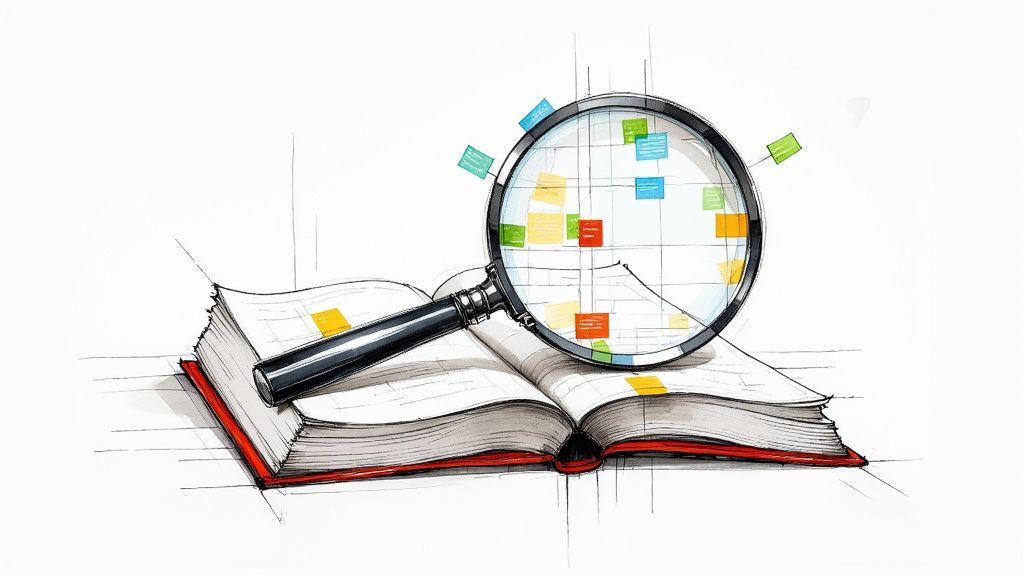AI for Book Metadata SEO to Boost Discoverability

🎯 Part of Our AI Marketing Series: This article focuses on metadata optimization strategies. For the complete marketing workflow covering how metadata fits into pre-launch preparation, advertising campaigns, and long-term discoverability, see our comprehensive Complete Guide to AI Book Marketing.
Using AI for book metadata SEO isn't some far-off idea anymore. It's a real-world, practical strategy that turns the frustrating guesswork of book discovery into a clear, data-driven science. Honestly, it's one of the best ways to give your book a fighting chance by optimizing its title, keywords, and description for how readers actually search today.
How AI Is Changing the Game for Authors
Welcome to the new reality of author marketing. If you've ever poured your soul into a book only to feel like you're shouting into an empty room, you know the struggle. The old ways of picking a title or keywords—relying on gut feelings or a few quick searches—just don't cut it in today's crowded digital bookstores.
This is exactly where artificial intelligence steps in to make a difference. Modern AI tools can chew through market trends, analyze real reader search patterns, and break down competitor strategies on a scale no human could ever manage alone. Instead of just guessing what might resonate with readers, you can get concrete data on what is working in your genre right now.
This shift to a data-first approach gives you some serious advantages:
- Work Smarter, Not Harder: Research that used to take days of tedious manual labor can now be wrapped up in minutes.
- Uncover Hidden Gems: AI is brilliant at finding those niche keyword opportunities and categories you'd likely never think of on your own.
- Gain a Competitive Edge: You can finally understand the "why" behind your genre's bestsellers and intelligently model their successful metadata strategies.
Moving From Guesswork to Precision
This isn't just a fleeting trend; using AI for optimization is quickly becoming the new standard. By 2026, it's expected that 86% of SEO professionals will have integrated AI into their daily work. A huge reason for this is AI's knack for handling repetitive tasks—a solid 67% of experts point to keyword research and meta-tag creation as top benefits.
Think of it this way: AI is your tireless research assistant. It sifts through mountains of data to hand you actionable insights, freeing you up to focus on what you do best—writing. All the while, you can rest easy knowing your book's marketing foundation is solid.
The difference AI makes isn't just theoretical. Let's look at the core elements of your book's metadata and see how this plays out.
Core Components of AI-Driven Book Metadata
This table breaks down the key metadata elements for books and explains the specific role AI plays in optimizing each one for maximum SEO impact.
| Metadata Element | Traditional Approach | AI-Enhanced Approach |
|---|---|---|
| Title & Subtitle | Brainstorming based on intuition, genre conventions, and what "sounds good." | Analyzing top-performing titles for patterns, identifying high-intent keywords, and generating dozens of data-backed options. |
| Book Description | Writing compelling copy, often focused solely on the plot or a summary of the contents. | Weaving in relevant search terms naturally, structuring for scannability, and optimizing for both human readers and search algorithms. |
| Keywords/Tags | Guessing what readers might search for or using broad, competitive terms. | Identifying long-tail keywords with high commercial intent, analyzing competitor tags, and uncovering niche search phrases. |
| Categories | Selecting 2-3 broad, obvious categories from a dropdown list. | Finding less competitive, highly relevant niche categories to increase the chances of hitting #1 bestseller status. |
With AI, every single piece of your book's digital identity becomes a targeted tool for discovery, rather than just a field you have to fill out.
Just look at the dramatic impact AI can have on the whole process.

As you can see, bringing AI into the mix doesn't just speed things up; it leads to better results. You get a much higher click-through rate and a far greater number of relevant tags, which directly translates into more visibility and, ultimately, more readers.
If you want to explore this further, you might be interested in our guide on how AI-driven tactics to boost book marketing. At the end of the day, using AI for your metadata isn't just about staying current—it’s about getting ahead of the curve.
Building Your AI Metadata Toolkit

Before you can start optimizing, you need the right set of tools. Putting together a smart, cost-effective AI for book metadata SEO toolkit is the first real step you'll take toward getting your book discovered. This isn’t about chasing every shiny new app, but about deliberately picking tools that actually solve your problems as an author.
Think of it like stocking a workshop. You need your trusty, all-purpose tools, but you also need a few specialized instruments for the detailed work. The best approach, I've found, is to mix free and paid options to get the most bang for your buck without draining your writing budget.
Subscribe & Get Your Free Marketing Plan Template
Receive regular updates on marketing best-practices, AI shortcuts, and get our proven 4-phase marketing roadmap for free.
Unsubscribe anytime.
Choosing Your Core AI Tools
Your toolkit really boils down to a few key categories. The idea is to have a go-to tool for each major task you'll face when creating your book's metadata.
- Large Language Models (LLMs): These are your creative workhorses. Models like ChatGPT, Claude, and Gemini are brilliant for brainstorming a dozen titles in a minute, drafting compelling book descriptions, and spitting out a long list of potential keywords. Their real power is in their conversational and creative-partner abilities.
- Specialized SEO Platforms: For the nitty-gritty analysis, you'll want something built specifically for SEO. These platforms are designed for tasks like checking out your competition, confirming keyword search volumes, and seeing how your book ranks over time. They give you the hard data to support the creative ideas you got from your LLM.
- Content Generation Tools: Some AI is built for very specific jobs. For instance, a Pinterest AI generator can whip up visual assets for your marketing, which shows how AI can help far beyond just the text on your Amazon page.
A strategy that works for many authors is using a free LLM like the standard version of ChatGPT for all the initial brainstorming. Then, they might invest in a one-off, detailed report from a service like ManuscriptReport.com to get that deep, data-driven analysis. This hybrid method gives you a fantastic balance of creative freedom and analytical power.
A common mistake I see is authors trying to use one tool for everything. An LLM might dream up a fantastic, catchy title, but it has no idea what the search volume is for the keywords in it. Combining tools is what gives you both the creative spark and the analytical proof.
Mastering the Art of the Prompt
The output you get from any AI is only as good as the input you give it. Honestly, learning how to write specific, detailed prompts is the single most important skill you can develop for using AI well. A lazy prompt like "write a description for my fantasy book" is going to get you a generic, cookie-cutter response you can't use.
A strong prompt, on the other hand, is loaded with context.
Look at the difference in this example prompt for a book description:
"Act as an expert book marketer who specializes in epic fantasy. I need you to write three distinct and compelling book descriptions, each about 150 words, for my novel, 'The Shadow of the Sunstone.'
- Version 1: Focus on the action.
- Version 2: Emphasize the mystery.
- Version 3: Make it character-driven.
The book is perfect for readers who love Brandon Sanderson and Patrick Rothfuss. Key plot points to include are: a disgraced mage, a stolen artifact, and a looming civil war. Please work in these keywords naturally: 'epic fantasy saga,' 'magic system,' and 'political intrigue.'"
This level of detail doesn't restrict the AI; it guides it. You're giving it the guardrails it needs to produce something that actually sounds like your book and is aimed squarely at your ideal reader.
Engineering Bestselling Titles with AI
 Let's be honest: your book's title is the most crucial piece of marketing you'll ever write. It's the first impression for both your future fans and the search algorithms that connect you to them. Forget just brainstorming. We can now use AI to actually engineer titles that are not only catchy but also built for discovery.
Let's be honest: your book's title is the most crucial piece of marketing you'll ever write. It's the first impression for both your future fans and the search algorithms that connect you to them. Forget just brainstorming. We can now use AI to actually engineer titles that are not only catchy but also built for discovery.
It all starts with giving the AI the core DNA of your book. I'm not just talking about the plot. You need to feed it the genre, the main themes, the overall tone, and, most importantly, a clear picture of your ideal reader. The more detail you provide upfront, the more potent and on-target the AI's suggestions will be.
A fantastic starting point I always recommend is to see what's already working. You can have an AI tool analyze the top 100 bestselling books in your specific Amazon category. Ask it to spot the patterns—what keywords keep popping up? What kind of emotional language are they using?
How to Write a Powerful Title-Generation Prompt
Your prompt is everything. A lazy prompt gets lazy results. Instead of just asking for "title ideas," you need to frame your request like you're briefing a marketing specialist.
Let’s say you've written a gritty sci-fi thriller. Here’s a prompt I'd use to get some real options:
"Act as a book marketing strategist specializing in cyberpunk thrillers. I need you to generate 20 potential titles for my new novel.
Core Details:
- Genre: Cyberpunk Thriller
- Themes: Corporate espionage, AI consciousness, identity theft
- Target Audience: Readers who love Blade Runner and William Gibson's Neuromancer.
- Tone: Fast-paced, dark, and thought-provoking.
Instructions:
- Give me 10 titles that are all about action and conflict.
- Give me another 10 titles that are more mysterious and philosophical.
- Make sure all titles are under 60 characters and naturally weave in keywords like 'cyber,' 'chrome,' 'shadow,' or 'protocol' where they fit."
See the difference? A prompt like this forces the AI to think strategically. It's not just a word generator anymore; it's a partner considering different marketing angles, giving you a diverse list of ideas grounded in what actually sells.
But here’s the tricky part. The game has changed since 2020. While we know that titles between 40 to 60 characters tend to get better click-through rates, there's a catch. Google actually rewrites about 61% of titles in its search results, which shows just how hard it is to keep full control. If you want to get into the weeds on this, there are some great insights about modern SEO statistics you can check out.
Refining and Picking a Winner
Once the AI spits out a list, your job shifts from creator to curator. Don't just grab the one that sounds coolest. Think of this new list as another dataset.
Take your top 5-10 contenders and feed them right back into the AI. Now, ask it to:
- Tell you which titles pack the biggest emotional punch.
- Analyze which ones contain the most valuable, high-intent keywords for your genre.
- Suggest subtitles that could add more clarity and extra keywords.
This back-and-forth process—generate, analyze, refine—is where the real value is. It transforms what used to be a creative guessing game into a methodical, data-driven strategy. By blending your own author's gut feeling with the raw analytical power of AI, you can land on a title that perfectly captures your story and is precision-engineered to be found on a very crowded digital bookshelf.
Writing Book Descriptions That Actually Sell

Let's be honest: a book description is sales copy. It's not just a plot summary. It’s the single most important piece of marketing text you'll write, and it has mere seconds to convince a potential reader to click "buy." This is where using AI for book metadata SEO stops being a gimmick and becomes a real strategic advantage, helping you craft blurbs that connect with readers and please the search algorithms.
Your first step is to think in multiples. Never settle for the first description an AI spits out. Instead, have it generate three or four different versions, each one taking a unique angle. This lets you experiment and see which hook resonates most strongly with your target audience.
If you’ve written a historical romance, for example, you could ask for:
- A version that plays up the epic, sweeping love story.
- Another that leans into the political danger and courtly intrigue.
- And a third that focuses squarely on the sharp, witty banter between your main characters.
Refine It with Your Unique Voice
Once you have those initial drafts, it's time to put on your editor hat. The AI-generated text is your raw clay, not the finished sculpture. It needs your authorial voice to feel authentic and compelling.
Read each version out loud. Does it sound like something you would actually write? Does it have the rhythm and soul of your book? Start tweaking the phrasing, reordering sentences, and injecting your unique personality. This combination—AI for the initial grunt work and your human touch for the final polish—is how you get a description that’s both optimized and truly yours.
I see so many authors make the mistake of just copying and pasting the AI’s first attempt. You have to treat that output as a starting point. The best blurbs are always a partnership between data-driven AI suggestions and your own creative instincts.
This hybrid approach is quickly becoming standard practice. By 2026, an estimated 37% of SEO professionals are already using AI to create meta titles and descriptions. While this can accelerate the process by 30% to 50%, it's the human refinement that separates a decent blurb from a great one.
To get even more out of this process, check out our ultimate guide to using an AI book description generator for some advanced techniques.
To help you get started, here are a few prompt formulas you can copy and paste directly into your AI tool.
AI Prompt Formulas for Book Descriptions
| Goal | Prompt Template | Example Output Focus |
|---|---|---|
| Hook-Driven Blurb | Write a 150-word book description for a [Genre] novel. Start with a gripping question or a shocking statement. Introduce the protagonist, [Protagonist's Name], and their central conflict. End with a cliffhanger that hints at the stakes. | A dramatic, fast-paced description that grabs the reader from the first sentence. |
| Character-Focused Blurb | Generate a book description focusing on the internal struggle of the main character, [Protagonist's Name], in my [Genre] book. Emphasize their motivations, fears, and the impossible choice they must make. Use an emotional and introspective tone. | A deep, personal blurb that appeals to readers who love character-driven stories. |
| Plot-Centric Blurb | Craft a book description that outlines the core plot of my [Genre] novel. Mention the inciting incident, the key turning points (without spoilers), and the ultimate goal. Keep the tone fast-paced and action-oriented. | A clear, exciting summary that highlights the twists and turns of your story. |
| Amazon A+ Content | Write 3 short paragraphs for Amazon A+ Content for my book, "[Book Title]". Paragraph 1: A powerful hook. Paragraph 2: Introduce the world and conflict. Paragraph 3: A call-to-action for readers who love [Comparable Author/Book]. | SEO-friendly, scannable text designed for Amazon's enhanced marketing sections. |
Experimenting with these prompts will give you a much richer set of drafts to work with.
Format for Scannability and Sales
Your final step is all about formatting. On retail sites like Amazon, a giant block of text is the kiss of death. Readers scan, they don't read word-for-word. You can even ask your AI to help structure the description with basic HTML to make it pop.
Aim for a clear, scannable structure:
- A Killer Hook: Open with a question or a bold claim that makes someone stop scrolling.
- The Core Conflict: Briefly introduce your hero and the main problem they need to solve.
- The Stakes: Hint at what could go wrong. What's at risk? Raise the tension without giving away the ending.
- A Clear Call-to-Action: End with a direct instruction. "Buy now to uncover the truth" or "Scroll up and grab your copy to join the adventure!"
When you combine a powerful hook, strategic keywords, and your own authentic voice, your book description transforms from a simple summary into a powerful sales tool, ready to turn browsers into buyers.
Unearthing Hidden Keywords and Categories with AI
If titles and descriptions are the flashy cover art of your book's online presence, then keywords and categories are the quiet, hardworking librarians shelving it in exactly the right place for a reader to find. Honestly, this behind-the-scenes work is what truly drives discovery. This is where using AI for book metadata SEO stops being a guessing game and becomes a much more precise, data-backed process.
The real goal here is to think past the obvious. Sure, your thriller is a "thriller," but that's not what gets you found. AI excels at digging through thousands of reader reviews, competitor book pages, and even online book club discussions to find the language your ideal readers are actually using. It helps you pinpoint those specific, long-tail keywords that signal a reader is ready to buy.
Moving Beyond Obvious Genre Labels
Here’s how I think about it: someone searching for a "thriller" is window shopping. But a reader searching for a "psychological thriller with an unreliable narrator set in a remote location"? That person has their wallet out. AI is your secret weapon for finding that second reader.
A practical way to start is by feeding an AI tool the top 10 bestsellers in your specific niche. Don't just pick any bestsellers; find the ones that feel most like your book. Then, give it a sharp, focused prompt.
"Analyze the reader reviews for these 10 bestselling psychological thrillers. Identify the top 15 recurring long-tail keywords and phrases that readers use to describe what they love about these books. Exclude common words like 'book,' 'read,' and 'author.'"
What you're doing here is turning the AI into a tireless market research assistant. It sifts through all that noise and hands you the authentic voice of your target audience. You’ll get a list of keyword gold—phrases like “slow-burn tension,” “morally gray characters,” or “plot twists I didn't see coming.”
Finding and Validating Your Categories
Once you have a solid list of powerful keywords, it’s time to find the right digital shelf to place your book on. This means picking the best—and often, less competitive—Amazon categories or BISAC codes. I see so many authors make the mistake of aiming for the broadest, most crowded categories, only to see their book get lost on page 50 within hours.
AI can help you hunt for those niche categories where you have a real shot at hitting a #1 bestseller rank, even for a day. That little orange "Bestseller" tag is incredibly powerful social proof and can kick off a major sales spike. Of course, this tactic works best when it's part of a larger plan that includes comprehensive content optimization strategies for your entire author platform.
Don't just take the AI's word for it, though. Validation is the final, critical step. Plug your potential keywords into an SEO tool to check their search volume. Are enough people actually typing these phrases into the search bar? For categories, investigate how many sales it takes to crack the top 10. A bit of manual research here pays huge dividends.
This entire process is a key piece of a much bigger puzzle. For a deeper dive, I highly recommend checking out these 7 steps to optimize book metadata for discovery. By blending AI-driven research with smart, manual validation, you’re not just hoping readers find you—you're strategically placing your book directly in their path.
Answering Your Questions About AI for Book Metadata
It's natural to feel a little uneasy when new technology starts changing how things are done. Whenever I talk to authors about using AI for book metadata SEO, a few common questions always pop up. The good news is, the reality of using these tools is a lot less scary than you might think.
Let's get right into the biggest concern I hear: originality. Authors worry that if they use AI, their book's marketing will sound robotic or just like everyone else's. It's a valid fear, but it comes from a slight misunderstanding of how to use AI effectively.
Think of AI as your super-powered research assistant and brainstorming partner, not your ghostwriter. The best approach is to treat anything it generates—a title idea, a book description draft—as raw clay. It's your job to take that data-backed starting point and mold it with your unique author voice, your personality, and your creative vision. The final product should always be a blend of machine-powered data and your human heart.
Will My Work Still Be Original?
Yes, absolutely. Here’s an analogy I like: a chef might use a food processor to chop onions in seconds, but that doesn't make them less of a chef. The final dish is a masterpiece because of their skill in combining flavors, seasoning perfectly, and plating beautifully. You're doing the same thing here. You guide the AI with smart prompts and then refine its output until it perfectly matches your book's soul.
The goal isn’t to replace your creativity but to amplify it. AI handles the grunt work of sifting through data, which frees you up to focus on the storytelling and emotional hooks that only a human author can craft.
Another question I get all the time is about the learning curve. Do you suddenly need to become a tech wizard? Not at all. Modern AI tools are surprisingly intuitive. If you can type a question into Google, you can write an effective prompt. The skill isn't in coding or technical jargon; it's in learning how to ask the right questions to get the results you want.
Is This an Ethical Way to Do Marketing?
Using AI to fine-tune your metadata is all about helping readers find your book, not tricking them. It's an ethical and incredibly smart way to give your work a fair chance in a very crowded marketplace.
You're using sophisticated tools to understand what your ideal readers are actually searching for. By optimizing your metadata, you're essentially putting up a bright, clear signpost that points them directly to your story. You're doing your future fans a huge favor by making it easier for them to discover a book they'll love.
Ready to turn your manuscript into a launch-ready marketing machine? ManuscriptReport.com delivers a comprehensive book report in minutes, packed with everything from blurbs and keywords to ad copy and social media posts. Spend less time on marketing and more time writing. Get your report here.
Enjoyed this article? Subscribe for more + get a free marketing roadmap template.
Receive regular updates on marketing best-practices, AI shortcuts, and get our proven 4-phase marketing roadmap template for free.
Unsubscribe anytime.
